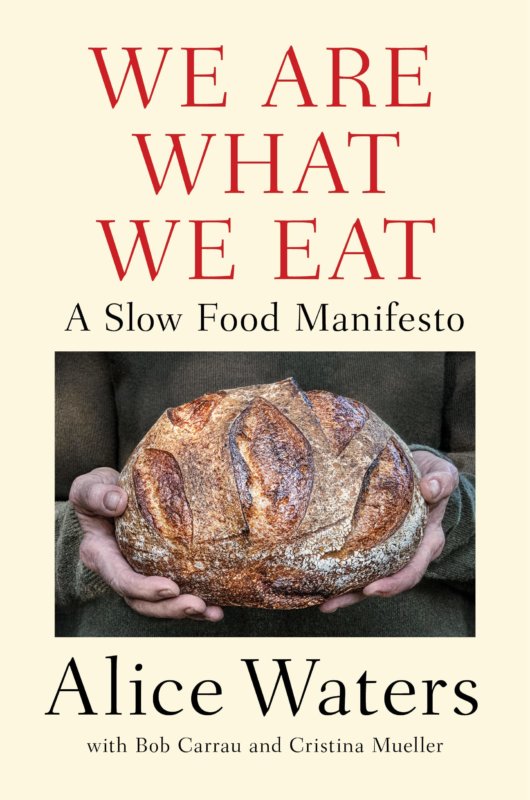Push for more slow food options
We Are What We Eat: A Slow Food Manifesto is the title of the 2021 book by local food advocate and restauranteur Alice Waters. She is based in California, but her book’s message is relevant for all of us.
 Whether you have an ample food budget, a modest one or are squeaking by with difficulty, it’s worth reflecting with her on what cultural values are embedded in the food options generally presented to the American public. It may influence the future food choices you make and encourage you to press for changes in the options available.
Whether you have an ample food budget, a modest one or are squeaking by with difficulty, it’s worth reflecting with her on what cultural values are embedded in the food options generally presented to the American public. It may influence the future food choices you make and encourage you to press for changes in the options available.
After World War II, U.S. agricultural policy shifted from price protections for farmers and consumers, to treating the products of agriculture as commercial commodities — something to make money on rather than a way to meet people’s need for nutritious food.
Chemical industries responded by creating and aggressively marketing fertilizers, herbicides, pesticides, etcetera. Agribusinesses grew large and influential.
They were so large and so influential that President Nixon’s 1971 choice for Secretary of Agriculture was their champion, Earl Butz. Butz advocated maximum production of commodities such as corn and soy to be sold here and abroad, using all possible farmland, fencerow to fencerow. Farmers were incentivized to buy larger equipment and the newest chemicals as ways to deal with the fertility, erosion and pollution problems that came with this approach. Earl Butz’ infamous rallying cry was “Get big, or get out!” Agribusiness, not food and farmers, has controlled US agricultural policy ever since.
This history made possible the rise of industrialized fast food, marketed as not only fast but cheap. Concerns about that industry in turn triggered the rise of local, often organic, minimally processed slow food, marketed as healthy for people, local economies and the land. Alice Waters looks at the very different values reflected in fast food compared to slow food, and the long-term ramifications of living by those values.
Culture is constructed based on what we believe to be basic truths. It affects how we look at the world and ourselves, and subconsciously guides all our decisions. Since culture is reinforced or modified through repeated behavior, when people act a certain way again and again, the behavior begins to seem “normal” and is accepted.
So it was with the development of a fast-food culture in the U.S., starting with the commodification of agriculture dependent on chemical inputs and leading to industrially mass-produced food, most often processed or ultra-processed with additives and preservatives. Fast-food restaurant chains and processed “convenience foods” in supermarkets are now generally accepted and expected. When we buy those products, we financially support the systems that make them available and accept the values of those systems.
Alice Waters provokes a hard look at these values, asking if we really do embrace them as core values we want to live by, especially when compared to the quite different values embedded in slow food culture.
Cultural values of fast food:
- Convenience — Finding food to eat should be easy and as effortless as possible.
- Uniformity — Food should look and taste the same wherever we are.
- Availability — We should have access to anything we want, wherever and whenever.
- Trust in advertising — We trust and like attention-grabbing promotion which tells us a product is good for us, even when more information often reveals it is not.
- Cheapness — “Getting a good deal” is most important, regardless of quality of the product or the real cost to people or the environment.
- More is better — Always.
- Speed — Things should happen fast, even though that means there’s no room for patience, reflection, maturing. Time is money and everything comes down to money.
Cultural values of slow food:
- Beauty — Universal qualities of beauty arise from Nature (including in food), and connect us to the mystery of life, to awe and joy. We need the nourishment of beauty.
- Biodiversity — Unlike uniformity, edible and general biodiversity demonstrate how varying traits of individual species together make a powerful network. This appreciation of “the other” naturally promotes acceptance, cooperation and integration in our lives.
- Seasonality — Eating in rhythm with the changing seasons promotes patience and discernment and living in harmony with Nature.
- Stewardship — Eating responsibly is part of being a good steward of the land and all that depend on it.
- Pleasure in work — Finding purpose in our own, or others’, paid and volunteer work (even the difficult or repetitive) promotes a welcome sense of dignity, worth and appreciation of skills.
- Simplicity — By identifying and cherishing the core elements of our lives, we connect with what is authentic and true for us. Simplicity fosters clarity, reminds us that less is actually more and to trust in the power of small actions.
- Interconnectedness — We can eat because we are connected to the people who grew, picked, transported, sold and prepared most of that food. Appreciation of our relationship with Nature and other people reminds us to act responsibly.
What are your core values, and how do they inform what you eat?
(Linda Hamilton is a member of the Charlotte Grange.)
